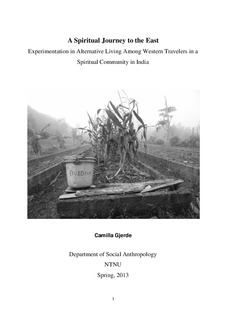| dc.description.abstract | What makes people from the West pursue happiness and inner self-fulfillment in a spiritual community in India? What triggers people to embark on a spiritual quest, and more importantly, what do they find? This thesis is based on my field trip carried out in a spiritual, intentional and international community called Auroville that is based in Tamil Nadu, south in India. Auroville’s philosophy is founded on the Indian philosopher Sri Aurobindo (1872-1959) who assert that man should work towards realizing one’s inner real potentials. Auroville became the place this practice should be realized, and were constructed by Mira Alfassa (1878-1973), Sri Aurobindo’s closest collaborator. Auroville became an experimental city and is dominated by this spiritual discourse that requires its citizens to seek and realize one’s inner self, which is associated with one’s origin and authenticity. I assert that the thought about authentic living and an authentic self found a great resonance amongst my informants, and created a change in their notions about the world. This I argue to be a result of the individual’s ability and will to change – which correspond with the self’s reflexive project in modern contemporary society. There is a need to become who one truly is (Bauman 2000; Giddens 1991; Helaas 2005). In this thesis I highlight how Western visitors – most of them working as volunteers – work with the self by articulating their inner journey in conversations with other visitors. I also investigate how the adoption of new worldviews became significant, where one picked and mixed from different spiritual discourses. One of these worldviews I have chosen to highlight is how nature became understood as being a big part of how one perceived life and authenticity. It became what was ‘real’, without being manipulated or transformed into something it was not. By volunteer work on the land and by practicing gardening new ways of experiencing reality seemed to appear, something that was shared and made explicit amongst the volunteers by incorporating Auroville’s spiritual vision about self-transformation. This fits well with the idea of modern (and Western) man, or the spiritual seeker; as one who chooses, mixes or exchanges different religious, spiritual and secular perspectives, philosophies and different activities, as a kind of spiritual bricoleur who shops from an eclectic spiritual supermarket (Helaas 2005; Kraft 2011). | nb_NO |
